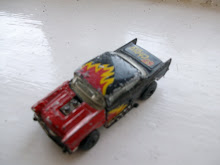Books about rock bands can be incredibly dull, especially if you’re a fan. Long drawn out descriptions of how everyone met, dry descriptions of how dull the recording process is and lists of chart placements. If you’re lucky, you get the various members calling each other names over who had the last brown M&M backstage in Kansas in 1980.
The exceptions tend to be about those bands/singers with unique personalities: the Smiths and the Clash spring to mind. To that, we can add British Sea Power, who have the advantage of their one-time manager Roy Wilkinson also being a journalist. Also, he was the older brother of two of the band, perhaps putting him in the ideal position to write Do It For Your Mum - a kind of memoir of his time pushing them onwards through the dodgy world of being a fairly successful band.
To this listener, British Sea Power may well have been the only band of the first decade of this century that really mattered. Their albums were superb, their live performances usually compelling. I remember first seeing them somewhere in London not long after they’d signed to Rough Trade, having known one of the people who did their press. She’d told me they were “from your way”, though we only caught the last 15 minutes of their show. However, this involved them stomping their way from a one-chord glam/drone rock affair, with their guitarist climbing the lighting rig and their keyboard player arming himself with a military drum, leaving the stage to march through the crowd. Clearly, I thought at the time, this was a band worth getting into. Wilkinson’s book has tales of people who thought the same, but to the extremes. There are fans who cover hundreds of miles to see a show on the other end of the country before turning up for their job the next morning – typical of a lot of bands, I would imagine.
But the crux of the story contained in Do It For Your Mum is around another member of the Wilkinson family.
Even as the band forms in the late 1990s, Ronald Wilkinson is a World War Two veteran well into his 70s, having brought up his six children in the small Cumbrian village of Natland. When his two youngest sons Scott and Neil form a band, he suddenly takes a deep interest in both them and indie rock in general. Nick Cave becomes a firm favourite - the only other musician to his ears who can be ranked higher than British Sea Power.
Indeed, it’s the tales of Wilkinson Snr that make up the best parts of the book. He’s constantly questioning Roy about the band, wanting to know every aspect of their development and why things aren't moving faster. He tells his son that he’s tried to contact U2 about getting a support slot, reasoning that even though the Irish supergroup are “charlatans, everyone knows that” it’ll be “good exposure”. Reading every text source he can get his hands on, he also urges his sons to further heights with the words “do if for your mum, do it for the Butthole Surfers”, having decreed the heroes of 80s Underground Indie to be a A Proper Band.
As stated, the book works due to Roy Wilkinson’s skill as a writer. The band themselves don’t really appear all that much: having interviewed Neil “Hamilton” Wilkinson and guitarist Martin Noble many years ago, I can confirm they’re lovely chaps, and the feeling in the book is that the whole band are a bunch of laid-back types who deal with the madness of being in a rock band with some ease. For the main part, at least - eventually, the road takes it toil and crankiness turns to quasi-revolt towards their manager's ideas.
Pressures begin to tell on him as well. There’s a touching moment where he reflects that while working with the band has brought him much closer to his dad (to the degree it actually begins to annoy him), it causes him no shortage of understandable angst at causing his relationship with his daughter to suffer.
There's also his frustration at not being able to push the group to the heights enjoyed by former support acts like the Killers and the Libertines. It's an understandable position: the band were hardly death metal and many of their singles had both the melodic strength and anthemtic nature of, say, Mr Brightside. Yet it appears that British Sea Power will have to be content with what they have. A shame, but there's always the music and there's always family: Do It For Your Mum is a worthy tribute to the values of both.
Subscribe to:
Post Comments (Atom)

No comments:
Post a Comment